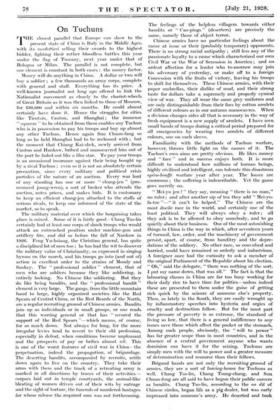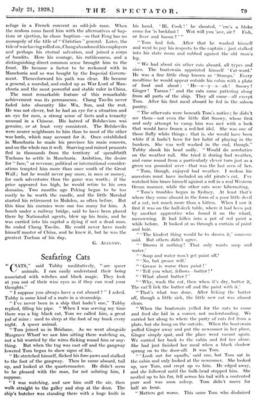Qn Tu chuns
rENTIE closest parallel that Europe can show to the present state of China is Italy in the Middle Ages, with its condottieri selling their swords to the highest bidder, fighting their rather bloodless battles this year under the flag of Tuscany, next year under that of Bologna or Milan. The parallel is not complete, but one element is constant in both cases : the money factor.
Money will do anything in China. A dollar ortwo will buy a soldier ; a few thousands an army corps, complete with general and staff. Everything has its price. A well-known journalist not long ago offered to link the Nationalist movement as closely to the chariot-wheels of Great Britain as it was then linked to those of Moscow, for £30,000 and within six months. He could almost certainly have done it. Hence the struggles for cities like Tientsin, Canton, and Shanghai ; the immense " squeeze " to be obtained from them enables any Tuchun who is in possession to pay his troops and buy up almost any other Tuchun. Hence again Sun Chuan-fang. so long as he held Shanghai had to be reckoned with ; but the moment that Chiang Kai-shek, newly arrived from Canton and Hankow, bribed and manoeuvred him out of the port he faded out like a film star. To pay your troops is an occasional insurance against their being bought up by a rival Tuchun ; even so it is not an absolutely certain precaution, since every military and political crisis partakes of the nature of an auction. Every war lord of any standing has one or more " chung-jen " (pro- nounced joong-wren), a sort of broker who attends the auction, notes prices, and makes bids. It is customary to keep an efficient chung-jen attached to the staffs of serious rivals, to keep one informed of the state of the market, so to speak.
The military material over which the bargaining takes place is mixed. Some of it is fairly good—Chang Tso-lin certainly had at least one corps of shock troops who would attack an entrenched position under .machine-gun and artillery fire, and did so before the fall of Nankow in 1926. Feng Yu-hsiang, the Christian general, has quite a disciplined lot of men too ; he has had the wit to discover the military value of Christianity, as expressed in singing hymns on the march, and his troops go into (and out of) action in excellent order to the strains of Moody and Sankey. The " professional soldier " element, that of men who are soldiers because they like soldiering, is entirely lacking. No Chinese like soldiering. But they do like being bandits, and the " professional bandit " element is very large. The gangs, from the little mountain band to large, highly organized societies like the Red Spears of Central China, or the Red Beards of the North, are a regular recruiting ground of Chinese armies. Bandits join up as individuals or in small groups, or one reads that this warring general or that has " secured the support of the Red Spears "—which means, of course, for so much down. Not always for long, for the more irregular levies tend to revert to their old profession, especially in defeat, when conditions become unpleasant and the prospects of pay or bribes almost nil. This is one of the worst features of civil war in China---the perpetuation, indeed the propagation, of brigandage. The deserting bandits, accompanied by recruits, settle down again to live on the country. They take their arms with them and the track of a retreating army is marked in all directions by traces of their activities— corpses laid out in temple courtyards, the animal-like bleating of women driven out of their wits by outrage and the sight of torture, the funerals of murdered hostages for whose release the required sum was not forthcoming. The feelings of the helpless villagers towards either bandits or " t'ao-pings " (deserters) are precisely the same, namely those of abject terror.
Chinese armies have no particular feelings about the cause at issue or their (probably temporary) opponents. There is no strong racial antipathy ; still less any of the passionate loyalty to a cause which characterized our own Civil War or the War of Secession in America ; and no ardent affection for a leader who to-morrow may join his adversary of yesterday, or make off to a foreign- Concession with the fruits of victory, leaving his troops to shift for themselves. These Chinese armies, with their paper umbrellas, their dislike of mud, and their strong taste for dollars take a supremely and properly cynical view of war. • They all wear the same grey uniforms and are only distinguishable from their foes by cotton armlets of different colours as in our autumn manoeuvres. When a division changes sides all that is necessary in the way of fresh equipment is a new supply of armlets. I have seen. small bands of troops during a critical period prepared for all emergencies by wearing two armlets of different colours, one on each sleeve.
Familiarity with the methods of Tuchun warfare, however, throws little light on the causes of it. The Tuchun's own aims are pretty obvious. He likes money and " face " and in success enjoys both. It is more difficult to understand how millions of human beings, highly civilized and intelligent, can tolerate this disastrous opera-bouffe warfare year after year. The losses are enormous ; the suffering is indescribable. Yet the game goes merrily on.
" Mei-yo jen ! " they say, meaning " there is no man," no ruler ; and after another sip of tea they add " Mei-yo- fa-tze "—" it can't be helped." The Chinese are the most docile race in the world, and certainly one of the least political. They will always obey a ruler ; all they ask is to be allowed to .obey somebody, and to go quietly about their business. One of the most astonishing things in China is the way in which, after seventeen years of turmoil, law, order, and the machinery of government persist, apart, of course, from banditry and the depre- dations of the soldiery. No other race, so convulsed and harried, could have remained so orderly and industrious. A foreigner once had the curiosity to ask a member of the original Parliament of the Republic about his election. " Oh," said the delegate, " there was nothing of the sort. I put my name down, that was all." The fact is that the labouring classes in China are far too busy working for their daily rice to have time for politics—unless indeed these are presented to them under the guise of getting rich quick by the seizure of someone else's property. Then, as lately in the South, they are easily wrought up by inflammatory speeches into hysteria and orgies of cruelty and destruction follow. But for the most part the pressure of poverty is so extreme, the standard of living so low, that there is a general indifference to any issues save those which affect the pocket or the stomach, Among such people, obviously, the " will to power " has far greater scope than in most countries, and in the absence of a central government anyone who wants dominion can have it for the seizing. Tuchuns are simply men with the will to power and a greater measure of determination and resource than their fellows.
Brigand bands are not only the recruiting ground of armies, they are a sort of forcing-house for Tuchuns as well. Chang Tso-lin, Chang Tsung-chang, and Sun, Chuan-feng are all said to have begun their public careers as bandits. Chang Tso-lin, according to the an dit of Chinese circles, began life as a pig dealer, but was early impressed into someone's army. He deserted and took refuge in a French convent as odd-job man. When the zealous nuns faced him with the alternatives of bap- tism or ejection, he chose baptism—so that Feng has no monopoly of the title of " Christian " general. Later, the tide of war having rolled on, Chang abandoned his employers and perhaps his eternal salvation, and joined a corps of bandits. Here his courage, his ruthlessness, and a distinguishing direct common sense brought him to the front. He became a factor to be reckoned with in Manchuria and so was bought by the Imperial Govern- ment. Thenceforward his path was clear. He became a general, a marshal, and ended up as War Lord of Man- churia and the most powerful and stable ruler in China.
The most remarkable feature of this remarkable achievement was its permanence. Chang Tso-lin never faded into obscurity like Wu, Sun, and the rest. He was not clever, but he had an eye for a situation and an eye for men, a strong sense of facts and a tenacity unusual in a Chinese. His hatred of Bolshevism was genuine, or at least very consistent. The Bolsheviks were nearer neighbours to him than to most of the other War lords, which may account for it. Once established in Manchuria he made his province his main concern, and on the whole ran it well. Starving and ruined peasants fled in thousands from the territory of spendthrift Tuchuns to settle in Manchuria. Ambition, the desire for " face," or revenue, political or international consider- ations tempted him more than once south of the Great Wall ; but he would "never pay more, in men or money, for such adventures than the game was worth ; if the price appeared too high, he would retire to his own domains. Two months ago Peking began to be too costly to be worth the candle, and the little Marshal started his retirement to Mukden, as often before. But this time his enemies were one too many for him. A bomb under a railway bridge, said to have been placed there by Nationalist agents, blew up his train, and he was carried into his capital a dying if not a dead man. So ended Chang Tso-lin. He could never have made himself master of China, and he knew it, but he was the greatest Tuchun of his day.
G. ALLENBY.





















































 Previous page
Previous page